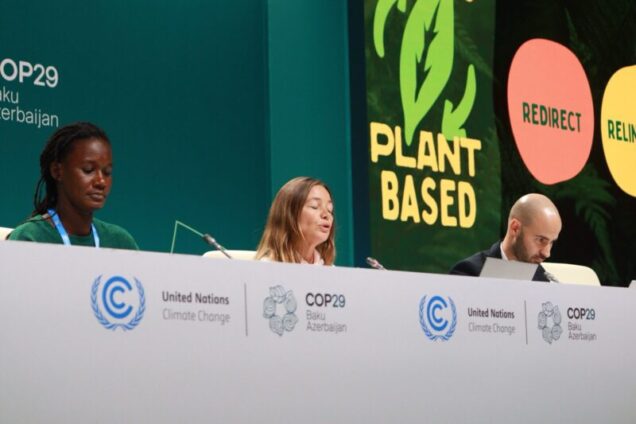
Audio By Carbonatix
A total of 33 cities, including Los Angeles, Amsterdam, and Edinburgh, have backed a call for a global Plant-Based Treaty, aiming to align the food system with the Paris Agreement and encourage the adoption of plant-based food policies at the local level.
Additional cities supporting the initiative include Tavira (Portugal), Didim (Turkey), Rainbow Lake (Canada), and several in the United Kingdom, such as Belfast, Exmouth, Haywards Heath, Lambeth, and Norwich.
In India, 16 cities have joined the movement, including Ahmedabad, Mundra, Rajkot, and Cadodara. In Africa, two cities are featured: Manduar in The Gambia and Kyotera in Uganda.
Plant-Based Treaty advocates Enric Noguera and Cindy Veltens introduced “Plant-Based Treaty in Action” to showcase how cities worldwide have begun implementing the 40 recommended proposals from the treaty.
“We need a global treaty and international cooperation to scale up plant-based solutions,” says Cindy Veltens, Plant-Based Treaty campaigner for Belgium and The Gambia.
During a press conference marking the opening of COP29, case studies from Edinburgh and Amsterdam were highlighted.
Edinburgh, which endorsed the Plant-Based Treaty in 2023, is implementing carbon labelling in schools and universities.
Meanwhile, Amsterdam, which signed the treaty in 2024, plans to partner with major employers and public institutions—including hospitals, community centres, and care facilities—to introduce Vegan Fridays and work toward a 60/40 plant-based-to-animal protein ratio by 2030.
“We urge world leaders to start negotiating a Plant-Based Treaty at COP29, and we need cities and countries to act on it and work on implementation,” says Enric Noguera, Plant-Based Treaty Europe cities campaigner.
Dr. Anita Krajnc, Global Campaign Director of the Plant-Based Treaty, emphasized that the demand at COP29 is clear: food policy is 30 years behind energy policy, and it’s time for the world to begin negotiations for a global Plant-Based Treaty.
According to Dr Krajnc, the treaty would complement the UN Paris Climate Agreement and help tackle one-third of global greenhouse gas emissions stemming from food systems.
“It will further protect our planetary boundaries by guiding the human community back to plant-based food systems,” says Dr Anita Krajnc, Global Campaign Director of the Plant-Based Treaty.
Latest Stories
-
Adom FM’s ‘Strictly Highlife’ lights up La Palm with rhythm and nostalgia in unforgettable experience
2 hours -
Ghana is rising again – Mahama declares
5 hours -
Firefighters subdue blaze at Accra’s Tudu, officials warn of busy fire season ahead
6 hours -
Luv FM’s Family Party In The Park ends in grand style at Rattray park
6 hours -
Mahama targets digital schools, universal healthcare, and food self-sufficiency in 2026
6 hours -
Ghana’s global image boosted by our world-acclaimed reset agenda – Mahama
7 hours -
Full text: Mahama’s New Year message to the nation
7 hours -
The foundation is laid; now we accelerate and expand in 2026 – Mahama
7 hours -
There is no NPP, CPP nor NDC Ghana, only one Ghana – Mahama
7 hours -
Eduwatch praises education financing gains but warns delays, teacher gaps could derail reforms
7 hours -
Kusaal Wikimedians take local language online in 14-day digital campaign
8 hours -
Stop interfering in each other’s roles – Bole-Bamboi MP appeals to traditional rulers for peace
8 hours -
Playback: President Mahama addresses the nation in New Year message
9 hours -
Industrial and Commercial Workers’ Union call for strong work ethics, economic participation in 2026 new year message
11 hours -
Crossover Joy: Churches in Ghana welcome 2026 with fire and faith
11 hours

